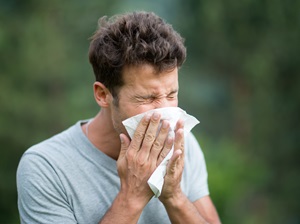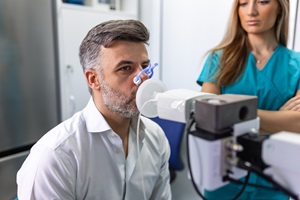Navigating Food Allergy Triggers: How to Identify and Manage Hidden Culprits

For individuals with food allergies, navigating daily meals can be a challenge, as hidden allergens may lurk in unexpected places. In this post, we’ll explore strategies for identifying and managing hidden food allergy triggers, empowering you to make informed choices and safeguard your health.
Understanding Hidden Food Allergy Triggers
Hidden allergens can be found in a variety of foods and food products, including:
- Processed foods
- Restaurant meals
- Cross-contamination
- Undeclared ingredients
Tips for Identifying Hidden Food Allergens
Read labels carefully: Check ingredient labels… READ MORE →
The Role of Hydration in Managing Allergies and Asthma

Staying hydrated is crucial for overall health, but it can be especially beneficial for individuals with allergies and asthma. Proper hydration can help keep mucous membranes moist, reduce the severity of symptoms, and improve overall respiratory function. In this post, we’ll explore the importance of hydration in managing allergies and asthma and provide tips for staying hydrated year-round.
The Importance of Hydration for Allergies and Asthma
Keeps mucous membranes moist: Proper hydration helps keep the mucous membranes in your respiratory tract moist, making it easier to expel allergens and… READ MORE →
Summer Allergy Survival Guide: Tips for Managing Allergies During the Summer Months

Summer is just around the corner! Summer is a time for outdoor adventures, beach trips, and backyard barbecues. However, for many people, it’s also a time for sneezing, itching, and watery eyes due to seasonal allergies. Pollen, mold, and insect bites can all trigger allergic reactions during the summer months. But with the right precautions, you can enjoy the sunny days ahead without the fear of allergies ruining your plans.
Common Summer Allergens
Pollen: Trees, grasses, and weeds release pollen into the air during the summer months, triggering allergic… READ MORE →
Memorial Day Beach Trip: How to Stay Safe from Allergens and Irritants

Memorial Day weekend often marks the beginning of summer and is a popular time for beach trips. However, for individuals with allergies and asthma, spending time at the beach can come with its challenges. In this post, we’ll discuss how you can stay safe from allergens and irritants at the beach, so you can make the most of your Memorial Day holiday.
Common Beach Allergens and Irritants
Sand allergens: Sand can contain various allergens, including pollen, mold spores, and dust mites, which can trigger allergic reactions.
Understanding Swelling Disorders: Causes, Symptoms, and Treatment Options

Swelling disorders, also known as edema, can affect various body parts and result from various causes. In this post, we’ll explore the different types of swelling disorders, including angioedema, eosinophilic esophagitis, sinusitis/rhinosinusitis, and ocular allergies. We’ll discuss their causes, symptoms, and available treatment options to manage and alleviate swelling.
What Is A Swelling Disorder?
A swelling disorder, also known as edema, is characterized by abnormal fluid accumulation in the body’s tissues, leading to swelling. This swelling can occur in various body parts, such as the arms, legs, hands, feet, face,… READ MORE →
Surviving Spring and Summer: A Guide to Managing Seasonal Allergies

Spring and summer bring warmer weather and blooming flowers, but they also bring seasonal allergies for many. In this post, we’ll explore the common triggers and symptoms of seasonal allergies during these seasons and provide tips on managing them effectively.
Recognizing Symptoms of Spring and Summer Allergies
Seasonal allergies, also known as hay fever or allergic rhinitis, are triggered by allergens that are present in the air during certain times of the year. Common allergens in the spring and summer include pollen from trees, grasses, and weeds. Symptoms of… READ MORE →
The Link Between Allergies and Skin Conditions: Understanding Dermatologic Allergies

Dermatologic allergies refer to allergic reactions that manifest on the skin, leading to conditions such as eczema, hives, and contact dermatitis. In this post, we’ll explore how allergies can affect the skin, common allergens that trigger skin reactions, and effective management strategies for these conditions.
How Allergies Manifest on the Skin
Allergic reactions on the skin can vary in severity and presentation. Eczema, also known as atopic dermatitis, is a chronic condition characterized by red, itchy patches of skin. It often occurs in individuals with a personal or family history… READ MORE →
Medication Allergy Testing: Safeguarding Against Adverse Reactions

Medication allergy testing is crucial in identifying and avoiding allergic reactions to medications. This post will explore why medication allergy testing is important, how it’s performed, and how it can help you stay safe when taking medications.
Why Medication Allergy Testing Matters
Allergic reactions to medications can range from mild to severe and can even be life-threatening. Symptoms of medication allergies can include hives, itching, swelling, and difficulty breathing. In severe cases, allergic reactions to medications can lead to anaphylaxis, a potentially life-threatening condition. Identifying medication allergies is essential to… READ MORE →
Demystifying Pulmonary Function Testing: Assessing Lung Health

Pulmonary function testing (PFT) is crucial in assessing lung health and diagnosing respiratory conditions. This post will delve into what PFT entails, its significance, and how it can help manage conditions like asthma and COPD.
Understanding Pulmonary Function Testing
Pulmonary function testing (PFT) is a group of tests that measure how well your lungs work. These tests can help diagnose respiratory conditions, determine the severity of lung problems, and evaluate the effectiveness of treatment. The most common types of PFTs include:
Spirometry: This test measures how much… READ MORE →
Understanding Rhinoscopy: A Closer Look at Nasal Health

Welcome to the official blog of . Rhinoscopy is a valuable diagnostic tool for examining the nasal passages for various conditions. In this post, we’ll explore what rhinoscopy entails, its benefits, and how it can aid in managing nasal allergies and sinus issues.
The Rhinoscopy Procedure
Rhinoscopy is typically performed using a specialized instrument called a rhinoscope, which allows the healthcare provider to examine the nasal passages closely. There are two main types of rhinoscopy: rigid and flexible.
Rigid rhinoscopy… READ MORE →




